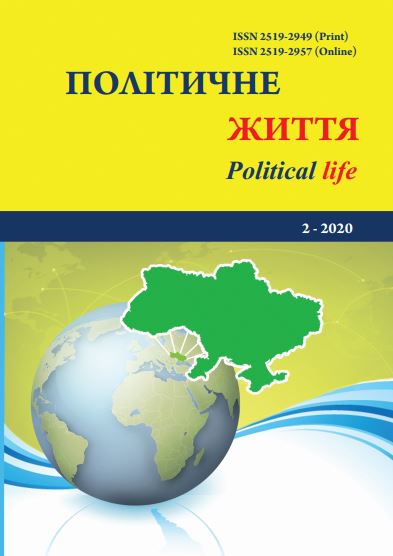Factors of growing Euroscepticism in the EU.
DOI:
https://doi.org/10.31558/2519-2949.2020.2.20Keywords:
Euroscepticism, populism, economic crisis, migration crisis, BrexitAbstract
The article analyzed the main reasons of Euroscepticism. In particular, the author paid attention
to the political conditions of Euroscepticism's increasing, and the causes of citizens' distrust in the EU. An interconnection between Euroscepticism and the crises in the EU and how these crises influenced a public opinion was determined.
According to the study, the reasons of Euroscepticism have divided into certain types. Opposition to the EU emerged with since the founding of the EU but was delitescent. During the twentieth century, despite some economic problems, the level of EU support grew steadily until 2007. However, due to the direct or indirect influence of internal and external factors, the opposition to the European Union began to gain momentum. As a result, Euroscepticism moved from a latent state to the implementation of practical tasks, an unprecedented process – the withdrawal of Great Britain from the organization.
Analyzing the statistical indicators of the citizens' position to the EU, as well as the domestic political situation in the organization, the author can conclude that not only significant economic and social problems have contributed to the growth of Euroscepticism. The growth of opposition to the European Union was influenced by the activities of populist parties and movements from Central and Eastern Europe, which began to join the organization after 2004. Eurosceptics from the new Europe uniting with anti-Europeans from the United Kingdom took advantage of the difficult economic situation in the organization and migration challenges. They also conducted a successful information campaign against the EU. As a result, confidence in the Union has dropped significantly. Furthermore, citizens doubt in the effectiveness of the organization was increased.
References
Bickerton C., Guérot U. Perspectives on the future of the EU. 2019. URL: https://www.ui.se/globalassets
/ui.se-eng/publications/other-publications/perspectives-on-the-future-of-the-eu.pdf (дата звернення 25.04.2020).
Convention determining the State responsible for examining applications for asylum lodged in one
of the Member States of the European Communities – Dublin Convention. 2003. URL: https://eur-lex.europa.eu
/legal-content/EN/ALL/?uri=CELEX:41997A0819(01) (дата звернення 15.04.2020).
De Wilde P. Under what conditions does Euroscepticism flourish? An evaluation of different approaches and empirical findings. 2010. URL: https://www.sv.uio.no/arena/om/aktuelt/aktuelle-saker/2010/deWilde-trial-lecture.pdf (дата звернення 25.04.2020).
Egenhofer С. Kaczyński Р. The Ever-Changing Union: An Introduction to the History, Institutions and Decision-Making Processes of the European Union. 2011. URL: https://www.researchgate.net/publication/228149154_ The_Ever-Changing_Union_An_Introduction_to_the_History_Institutions_and_Decision-Making_Processes_ of_the_European_Union (дата звернення 26.04.2020).
Employment, Social Policy, Health and Consumer Affairs Council (Health). 2020. URL: https://www.consilium.europa.eu/en/meetings/epsco/2020/02/13/ (дата звернення 27.04.2020).
Fine S. All at sea: Europe’s crisis of solidarity on migration. European Council of Foreign Relations. 2019. URL: https://www.ecfr.eu/publications/summary/all_at_sea_europes_crisis_of_solidarity_on_migration
(дата звернення 25.04.2020).
Hooghe L. Gary M. Sources of Euroscepticism. Acta Politica. 2007. URL: http://garymarks.web.unc.edu/files /2016 /09 /hooghe_marks_sources-of-euroskepticism.pdf (дата звернення 01.05.2020).
How “European” do EU citizens feel? Eurobarometer. European Comission. 2016. URL: https://ec.europa.eu/commfrontoffice/publicopinion/topics/fs5_citizen_40_en.pdf (дата звернення 27.04.2020).
Immigration in the EU. Eurostat. 2015. URL: https://ec.europa.eu/home-affairs/sites/homeaffairs/files/e-library/docs/infographics/immigration/migration-in-eu-infographic_en.pdf (дата звернення 30.04.2020).
Jones T. German AfD parliamentarian could be under Russian influence: report. Deutsche Welle. 2019. URL: https://www.dw.com/en/german-afd-parliamentarian-could-be-under-russian-influence-report/a-48221119
(дата звернення 03.05.2020)
Larsen Е., Cutts D. Do Terrorist Attacks Feed Populist Eurosceptics? 2020. URL: https://ejpr.onlinelibrary.wiley.com/doi/epdf/10.1111/1475-6765.12342 (дата звернення 30.04.2020).
Migrant crisis: Migration to Europe explained in seven charts. BBC. 2016. URL: https://www.bbc.com/news/world-europe-34131911 (дата звернення 01.05.2020).
O’Reilly Е. How transparent are the EU Institutions? 2018. URL: https://www.ceps.eu/ceps-publications /how-transparent-are-eu-institutions/ (дата звернення 25.04.2020).
Public Opinion іn The European Union. European Commission. 2014. URL: https://ec.europa.eu /commfrontoffice /publicopinion/archives/eb/eb81/eb81_publ_en.pdf (дата звернення 02.05.2020)
Results of the EU28 Survey 2018 on coalition building in the European Union. The European Council of Foreign Affairs. 2018. URL:https://www.ecfr.eu/page/ECFR269_EU_COALITION_EXPLORER_2018_V1.10.pdf (дата звернення 28.04.2020).
Risse T. Identity Politics and European Integration: The Case of Germany. 2005. URL: https://www.cambridge.org/core/books/idea-of-europe/identity-politics-and-european-integration-the-case-
of-germany/475ADD44E57C492D972899D22E3334AA (дата звернення 25.04.2020).
Taggart Р., Szczerbiak А. The Party Politics of Euroscepticism in EU Member and Candidate States. 2002. URL:https://www.researchgate.net/profile/Aleks_Szczerbiak/publication/237536121_The_Party_Politics_
of_Euroscepticism_in_EU_Member_and_Candidate_States/links/5534fb440cf2df9ea6a4122f/The-Party-Politics-
of-Euroscepticism-in-EU-Member-and-Candidate-States.pdf (дата звернення 25.04.2020).
The EU economy: 2000 review. European Commission. Directorate-General for Economic and Financial Affairs. 2000. URL: https://ec.europa.eu/economy_finance/publications/pages/publication1716_en.pdf
(дата звернення 01.05.2020).
The European economy since the start of the millennium. А Statistical Portrait. URL:https://ec.europa.eu/eurostat/cache/digpub/european_economy/bloc-1a.html?lang=en (дата звернення 25.04.2020).
Treaty of Rome. European Parliament. 1958. URL: https://www.europarl.europa.eu/about-parliament/en
/in-the-past/the-parliament-and-the-treaties/treaty-of-rome (дата звернення 25.04.2020).
Vanhoonacker S. Reforming the EU Institution – Challenge for the Council. The rotating Presidency
of the Council of the EU. University of the Maastricht. URL: https://www.swp-berlin.org/fileadmin/contents/products /projekt_papiere/sem5_vanhoonacker_schout_sicher.pdf (дата звернення 03.05.2020).
Walraed D. What are the trends and dominant drivers of Euroscepticism in the UK, Germany and European Union over the last decade? 2016. URL: https://www.ie-ei.eu/Ressources/FCK/image /Theses/WALRAED_Delfien.pdf (дата звернення 25.04.2020).
Wike R., Stokes B. Europeans Fear Wave of Refugees Will Mean More Terrorism, Fewer Jobs. Pew Research Center. 2016. URL: https://www.pewresearch.org/global/2016/07/11/europeans-fear-wave-of-refugees-will-mean-more-terrorism-fewer-jobs/ (дата звернення 27.04.2020).
Young people and Brexit: a generational divide. 2017. URL: https://blogs.cardiff.ac.uk/wiserd/2017/02/24 /young-people-and-brexit-a-generational-divide/ (дата звернення 28.04.2020).

